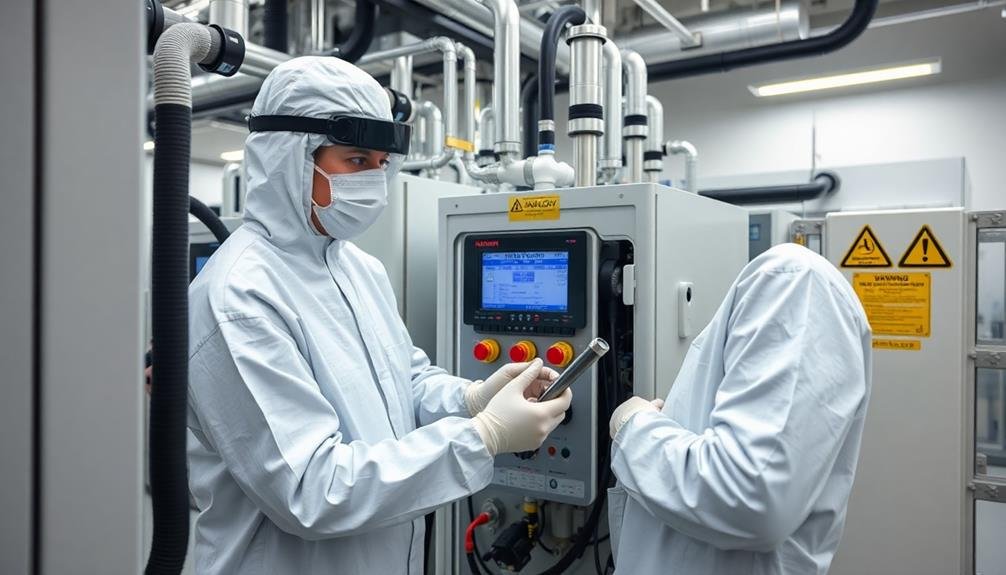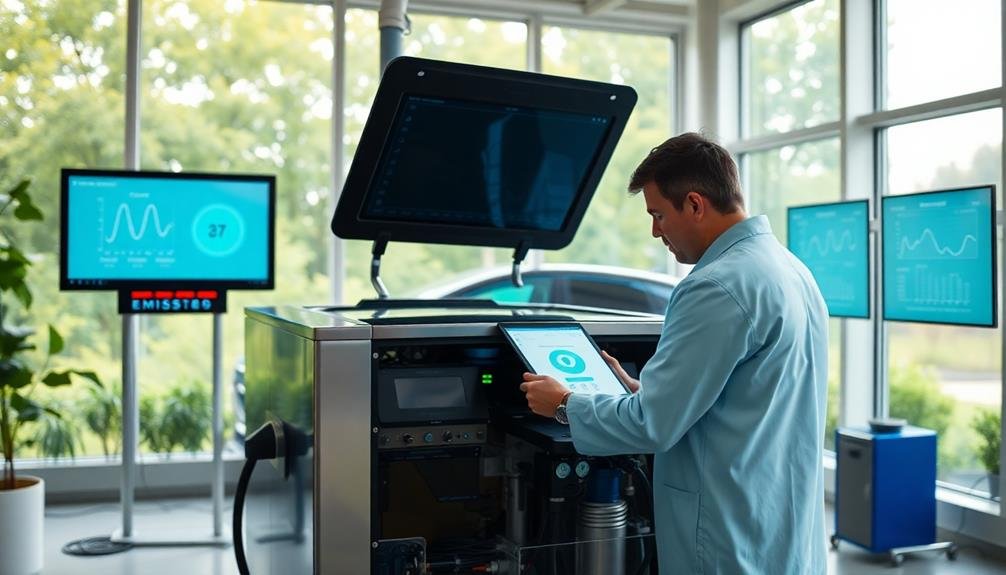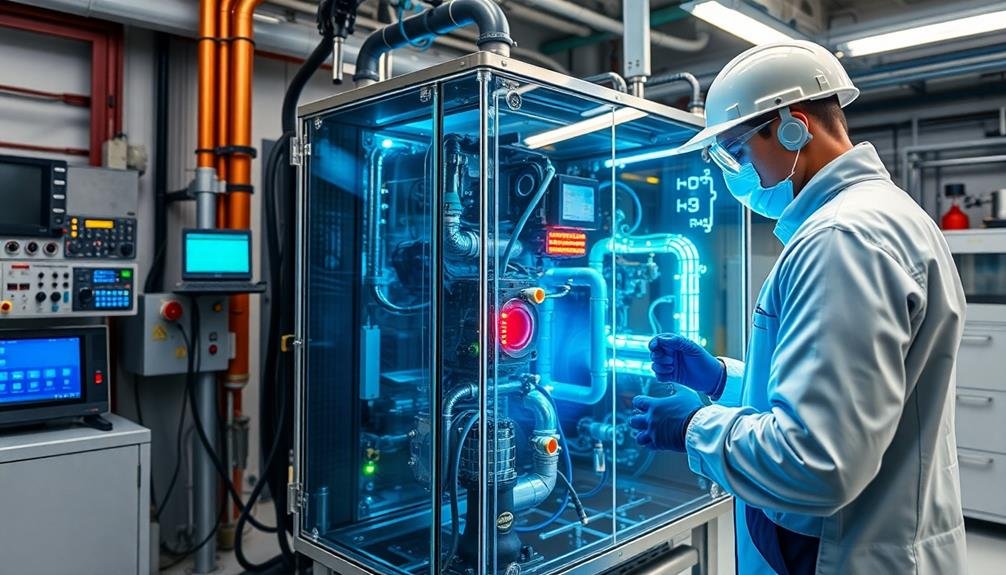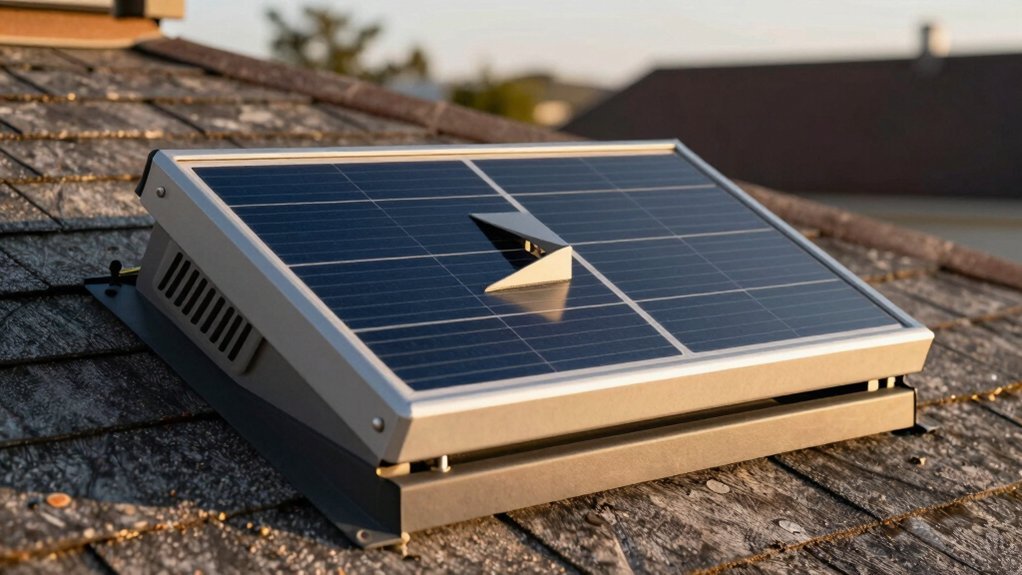Regular fuel cell check-ups are essential for maintaining safety, optimizing performance, and extending the lifespan of your hydrogen-powered system. These check-ups guarantee proper ventilation, detect potential leaks, and verify the functionality of safety equipment. They help monitor key performance indicators, allowing you to fine-tune efficiency and prevent costly damage. By evaluating critical components and tracking degradation rates, you'll maximize durability and plan for necessary maintenance. Implementing a preventive maintenance schedule can save you money in the long run while reducing environmental impact through improved efficiency. Discover how these routine inspections can enhance your fuel cell's safety, performance, and longevity.
Safety First

The importance of safety during fuel cell check-ups can't be overstated. When you're dealing with hydrogen-powered systems, you're working with a highly flammable gas that requires careful handling. Always wear appropriate personal protective equipment, including safety glasses, gloves, and flame-resistant clothing.
Guarantee proper ventilation in your workspace to prevent hydrogen accumulation. Before starting any inspection, make sure the fuel cell system is completely shut down and depressurized. Use calibrated gas detectors to check for hydrogen leaks before and during the check-up process.
Never use open flames or spark-producing tools near the fuel cell. Be familiar with emergency procedures and have the necessary equipment, such as fire extinguishers, readily available. Regularly review and update your safety protocols to stay current with industry standards.
During the check-up, inspect all connections, seals, and components for signs of wear or damage. Pay special attention to hydrogen storage tanks and delivery systems. Document all findings and address any issues immediately.
Performance Optimization
With safety measures in place, you can focus on enhancing your fuel cell's performance. Regular check-ups play an essential role in maintaining peak efficiency. During these inspections, technicians can identify and address minor issues before they escalate into major problems, guaranteeing your fuel cell operates at its best.
You'll want to monitor key performance indicators like power output, fuel efficiency, and voltage stability. These metrics provide valuable insights into your fuel cell's health and can help you spot trends that might indicate declining performance.
Don't overlook the importance of proper maintenance schedules. Adhering to manufacturer-recommended service intervals can considerably extend your fuel cell's lifespan and maintain its efficiency.
Keep an eye on your fuel cell's operating temperature and pressure. Deviations from ideal ranges can lead to reduced performance or even damage. Regularly check and clean filters to prevent contaminants from affecting your fuel cell's operation.
Additionally, verify that all connections are secure and free from corrosion. By staying proactive with these check-ups, you'll maximize your fuel cell's performance, reliability, and longevity, ultimately saving time and money in the long run.
Longevity and Durability

Durability and longevity are essential factors in fuel cell performance over time. Regular check-ups play a significant role in guaranteeing your fuel cell system maintains its efficiency and reliability for years to come. By conducting routine inspections, you'll identify potential issues before they escalate into costly repairs or system failures.
During these check-ups, you'll assess the condition of key components like the membrane electrode assembly, catalyst layers, and bipolar plates. You'll look for signs of degradation, such as membrane thinning or catalyst poisoning, which can greatly impact your fuel cell's lifespan. By addressing these issues promptly, you'll extend the operational life of your system and maintain its peak performance.
Regular maintenance also helps you track the system's degradation rate over time. This information is imperative for predicting when major overhauls or replacements might be necessary, allowing you to plan and budget accordingly.
Additionally, proper upkeep guarantees that your fuel cell system continues to meet safety standards and environmental regulations throughout its lifetime. By investing in regular check-ups, you're safeguarding your fuel cell's longevity and optimizing its durability for sustained, reliable operation.
Cost-Effective Preventive Maintenance
Regular fuel cell check-ups don't have to break the bank. By implementing a cost-effective preventive maintenance plan, you'll save money in the long run and extend your fuel cell's lifespan.
Start by creating a schedule for routine inspections, focusing on key components like the membrane, electrodes, and cooling system. These checks can often be performed in-house with minimal training, reducing the need for expensive technician visits.
Invest in basic diagnostic tools to monitor your fuel cell's performance. Simple meters can help you track voltage, current, and temperature, allowing you to spot potential issues before they escalate.
Keep detailed records of these measurements to identify trends and predict when maintenance might be necessary.
Don't overlook the importance of proper cleaning. Regularly removing dust and debris from air intakes and filters can prevent costly damage and maintain efficiency.
Consider using low-cost, non-abrasive cleaning solutions specifically designed for fuel cells.
Lastly, stay informed about your fuel cell's specific maintenance requirements. Manufacturers often provide guidelines for cost-effective upkeep.
Environmental Impact Reduction

How can regular fuel cell check-ups contribute to reducing environmental impact? By maintaining peak performance, you'll guarantee your fuel cell operates at peak efficiency, minimizing waste and emissions. Regular check-ups help identify and address potential issues before they lead to decreased efficiency or system failure, which could result in increased energy consumption and environmental harm.
During these inspections, technicians can fine-tune your fuel cell system, enhancing its fuel-to-energy conversion rate. This means you'll use less fuel to produce the same amount of power, reducing your overall carbon footprint. Additionally, proper maintenance extends the lifespan of your fuel cell, reducing the need for premature replacement and the associated environmental costs of manufacturing new units.
Here's a breakdown of the environmental benefits of regular fuel cell check-ups:
| Benefit | Short-term Impact | Long-term Impact |
|---|---|---|
| Improved Efficiency | Lower fuel consumption | Reduced resource depletion |
| Extended Lifespan | Fewer replacements needed | Less manufacturing waste |
| Enhanced Performance | Decreased emissions | Improved air quality |
| Early Issue Detection | Prevented system failures | Avoided environmental incidents |
Frequently Asked Questions
How Often Should I Schedule Fuel Cell Check-Ups?
You should schedule fuel cell check-ups every 6 to 12 months, depending on your system's usage and manufacturer recommendations. Don't skip these appointments; they'll help maintain efficiency, detect issues early, and extend your fuel cell's lifespan.
Can I Perform Fuel Cell Maintenance Myself?
You shouldn't attempt fuel cell maintenance yourself. It's complex and potentially dangerous. Always rely on certified technicians for this task. They've got the necessary training, tools, and expertise to safely service your fuel cell system.
What Qualifications Should a Fuel Cell Technician Have?
You'll want a fuel cell technician with specialized training in electrochemistry, electrical systems, and safety protocols. They should have certifications from recognized institutions and hands-on experience. Look for someone who's up-to-date with the latest fuel cell technologies.
Are Fuel Cell Check-Ups Covered Under Warranty?
You'll need to check your specific warranty terms. Some manufacturers cover routine check-ups, while others don't. It's best to review your warranty or contact the manufacturer directly to understand what's included in your coverage.
How Long Does a Typical Fuel Cell Check-Up Take?
You'll typically spend about 1-2 hours for a fuel cell check-up. It's an extensive process that includes inspecting components, running diagnostics, and testing performance. Don't skip it, as it's vital for maintaining your fuel cell's efficiency.
In Summary
You've seen why regular fuel cell check-ups are vital. They keep you safe, optimize performance, and extend your system's lifespan. By staying on top of maintenance, you'll save money in the long run and reduce your environmental impact. Don't neglect these vital check-ups; they're your key to a reliable, efficient, and eco-friendly fuel cell system. Make them a priority, and you'll reap the benefits for years to come.





Leave a Reply